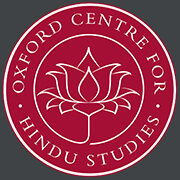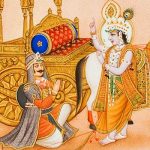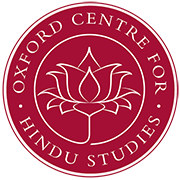Bhagavad Gita: Lecture Series
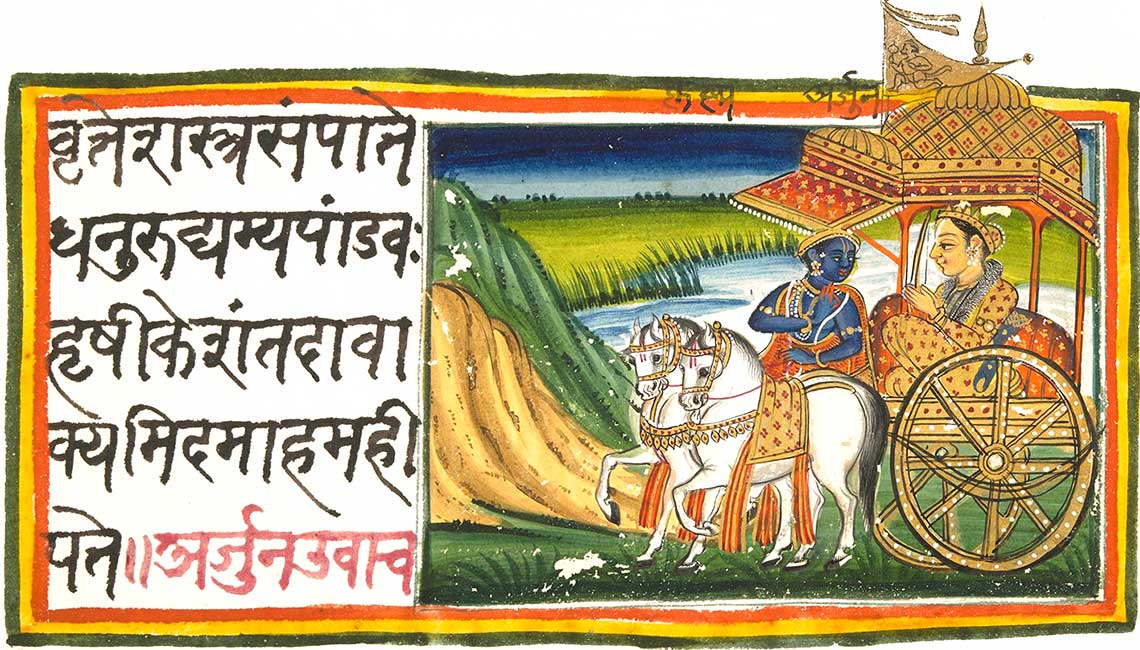
Bhagavad Gītā is a central text in Indian philosophy. Set on an ancient battlefield, we may wonder at its application to 21st-century life. This weekend of interactive discussions with scholars and practitioners explores why millions still find the Gītā relevant.
What is the Gītā about?
What does it say about nature, the world, and life itself?
What goals and practices does it define?
This lecture series gives you the opportunity to revisit one of our Weekend Schools.
The lectures are all available immediately and permanently.
There is a user forum as well, but unlike our Online Courses, these aren’t moderated and there are no assignments.
£85
Bhagavad Gita: Lecture Series
How Does Kṛṣṇa Teach?
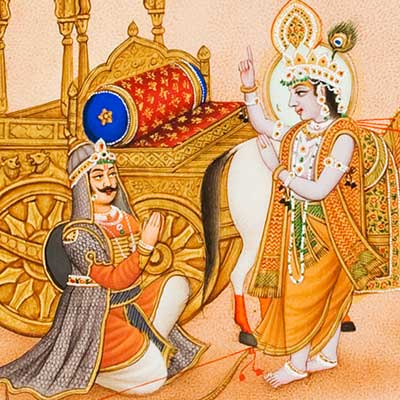
Before offering an outline of the Gita’s philosophical and theological content, we will reflect on the manner and methods of Krishna’s instruction to Arjuna and the dynamics that transformed a breakdown to a breakthrough. We examine how Kṛṣṇa revives Arjuna’s lost sense of self. And keeping the focus on Kṛṣṇa as educator and counsellor, we consider the pedagogical insights of the Gītā’s sacred dialogue. How does Kṛṣṇa teach? What promotes Arjuna’s understanding? What conditions allow for Arjuna’s eventual epiphany?
Tutor: Anuradha Dooney
Bhagavad Gītā’s Answers to the Mahābhārata’s Questions
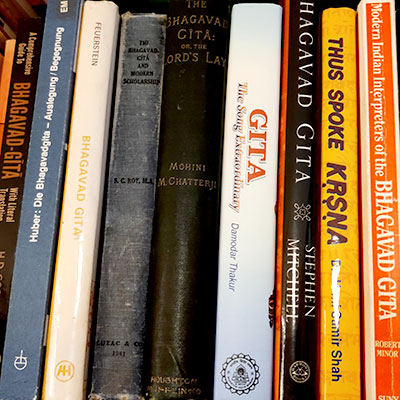
The Mahābhārata raises fundamental questions about how we should live in the world, about the nature of the Deity, and about liberation from rebirth, and it is in the Bhagavad Gītā that we find comprehensive answers offered to these fundamental questions. In this talk we will consider how the Bhagavad Gītā is best understood in relation to the Mahābhārata.
Tutor: Dr Nick Sutton
Found in Translation, Sanskrit in the Bhagavad Gītā
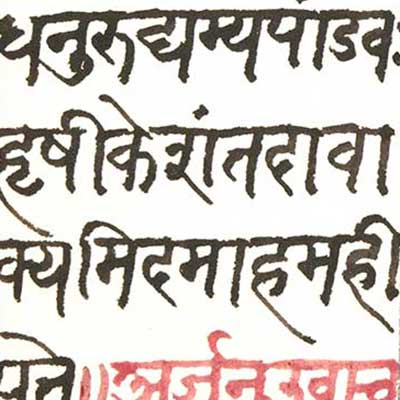
The Bhagavad Gītā has perhaps been more widely translated and commented on than any other Sanskrit text and with good reason. Many of its words lend themselves to multiple interpretations. By looking at and chanting key verses, and examining common terms, such as jñāna, buddhi, karma, and dharma within the text, we will explore how this work continues to inspire. Looking directly at the Sanskrit yourself opens a window into the many ideas that can be lost as well as found in translation.
Tutor: Zoë Slatoff
The Self and the Body in the Gītā
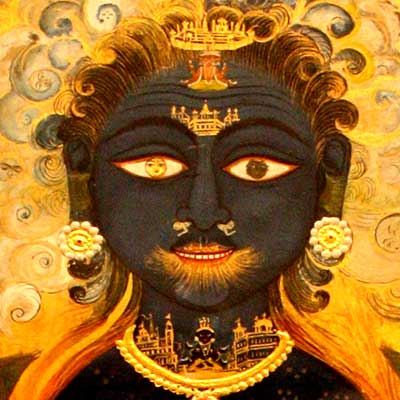
We explore notions of self and body in the Gītā as expressed through the text’s narrative and metaphors. The Gītā presents three different senses by which the self can be contrasted with the body. The first, an elementary contrast between a perennial self and temporary body, is presented as a direct consequence of Arjuna’s grief and is meant to inspire him to look beyond his present troubles and mortality. The second sense looks to Sankhya categories that define the self as superior in nature to (or a manipulator of) the body. This breakdown occurs after Kṛṣṇa has described various yogic practices and it moves the narrative into better understanding of the self as an exploiter of the resources of the body. The third sense of self is that it is a knower and that the body is the known. The metaphor used for the body is that of an agricultural field, a place where seeds (desires and acts) are planted and their fruits harvested.
Tutor: Dr Alan Herbert
Divinity and the Divine in Bhagavad Gītā
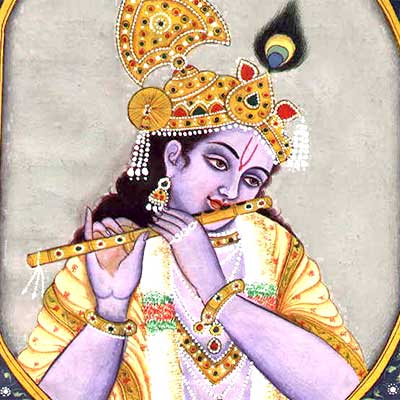
The significance of the Bhagavad Gītā largely stems from how it draws together the earlier wisdom of the Upaniṣads and the devotional expressions of Indian religion that increasingly come to the fore in later centuries. In this talk, we will move focus from the Gītā as a Yoga text to the insights into the divine identity that Kṛṣṇa reveals and emphasises as the Gītā progresses. We will see how the Gītā presents revelations about the nature of God and reveals bhakti-yoga as the path to liberation, thereby expanding on Patañjali’s phrase in the Yoga Sūtras (1.23): īśvara-praṇidhānād vā (it may be achieved by devoting oneself to the Lord).
Tutor: Dr Nick Sutton
Arjuna, Acyuta and the Strategic Structure of the Gītā

Bhagavad Gītā is a masterpiece not only in terms of its content, but also in terms of the relationship between its content and its form. The Lord’s Song exhibits a sophisticated structure, one adopted to guide interpretation. This presentation first charts the structure of the Bhagavad Gītā in light of the ‘dharmic double helix’, showing how the Gītā interweaves both worldly and otherworldly concerns, advocating both tranquility and the discharge of violent force. This presentation then pays close attention to the Bhagavad Gītā’s strategic tripartite placement of probably the most significant of Kṛṣṇa’s epithets: Acyuta (lit. unfallen), i.e., he who is physically, emotionally, spiritually upstanding.
Tutor: Dr Raj Balkaran
How the Gītā Changed Yoga
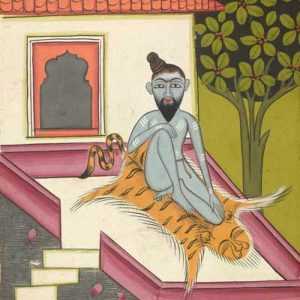
The Bhagavad Gītā plays an influential role in yoga history. Rejecting the asceticism of early practitioners, it advocates engagement in worldly affairs and describes a variety of spiritual paths. The highest of these is devotion to a personal deity who is present in everything – combining ideas from the early Upaniṣads with seeds of inspiration for later approaches to physical yoga.
Tutor: Daniel Simpson
The 21st Century Gita

One of the great ideas of Hindu traditions is the cyclical nature of the world. The Bhagavad Gītā too speaks of the ocean of saṃsāra. In worldly existence this teaching implies there is nothing new under the sun, just old ideas reframed in new contexts. In this session we challenge the Gītā to address three pressing issues of our day: Identity, conflict, and the environment. What can Kṛṣṇa’s teachings to Arjuna contribute to discourses on Black Lives Matter or #MeToo? What of the complex issues of gender politics and the urgency of environmental concerns? Can the Gita speak to these dilemmas and remain relevant to modern battle grounds.
Tutor: Shaunaka Rishi Das
Your Tutors
Dr Raj Balkaran
Dr Raj Balkaran is a scholar of Sanskrit narrative texts and the author of The Goddess and the King in Indian Myth (Routledge 2018), The Goddess and the Sun in Indian Myth (Routledge 2020). Having taught comparative religion and mythology at the University of Toronto School of Continuing Studies for a decade, he now Tutors at the Oxford Centre for Hindu Studies where he also serves on the Continuing Education Department’s Course Development Board. Alongside his academic training, he has received extensive spiritual training as part of an oral tradition dedicated to the transmission of Indian wisdom teachings. Integrating his academic and spiritual training, he has founded the online School of Indian Wisdom where he designs and delivers original online courses centred on the practical life wisdom to be found in the philosophical, mythological and spiritual traditions of ancient India. Beyond teaching and research, Dr Balkaran runs a thriving life consulting practice and hosts the New Books in Indian Religions podcast.
Shaunaka Rishi Das
Shaunaka is founder/Director of the Oxford Centre for Hindu Studies and Oxford University’s first-ever Hindu Chaplain. Shaunaka has shepherded the OCHS into its role as the world’s best centre for Hindu Studies and is a well-known broadcaster and speaker.
Anuradha Dooney
Anuradha was awarded a Masters in the Study of Religion at Oxford. She is a faculty member of the OCHS Continuing Education Department and has played a key role in curriculum development.
Dr Alan Herbert
With a D.Phil. in Theology and Religion at Oxford, Alan is a Post-doctoral Research Fellow at the Oxford Centre for Hindu Studies. His current projects include philosophical approaches to the Vaiṣṇava concept of God and the intersection between Hinduism and secular society.
Daniel Simpson
Daniel has a Master’s degree in Traditions of Yoga and Meditation from SOAS, University of London. He’s also a devoted practitioner of asana, pranayama and meditation, which he’s studied on numerous visits to India since the 1990s. Daniel previously worked as a foreign correspondent, which helps him make complex subjects feel accessible. He writes about yoga for magazines and on his website: www.danielsimpson.info
Dr Zoë Slatoff
Dr Zoë Slatoff has created and tutors a comprehensive series of Sanskrit courses for the Oxford Centre for Hindu Studies. She has a PhD in Religion and Philosophy from Lancaster University and an MA in Asian Languages and Cultures from Columbia University. She teaches Sanskrit and Yoga Philosophy in the Yoga Studies MA program at Loyola Marymount University in Los Angeles. Zoë is the author of Yogāvatāraṇam: The Translation of Yoga, a Sanskrit textbook based on classic yoga texts. She also taught for many years at her yoga shala in NY, Ashtanga Yoga Upper West Side.
Dr Nick Sutton
Nick is the Director – and the heart and soul – of the OCHS Continuing Education Department. He is a dedicated teacher with decades of experience in making sometimes-confusing traditions relevant. He has created over a dozen online courses and is working on many more. He has written translations and commentary on Bhagavad Gītā and the Yoga Sūtra. Nick received his Phd from Lancaster University (1995). His thesis was on the religious teachings of the Mahabharata.
